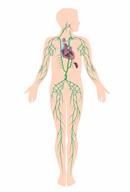ThisisPatientEngagementcontent
Castleman Disease
Learn more about our Patient Engagement products now! Turn your patients into active participants in their healthcare by giving them easy access to the same evidence-based information you trust – but delivered in an easy-to-understand format.

Castleman disease (CD) is a group of rare diseases that affect lymph glands, also called lymph nodes, and lymphatic tissue. Lymph nodes and lymphatic tissue are part of the lymphatic system. This system is part of your body's defense system, also called the immune system.
Lymph nodes are clumps of tissue that filter germs and waste from tissues in your body to your bloodstream. They're found in different places in your body, such as your abdomen, armpits, and groin. CD causes lymph nodes to get bigger from too many cells forming in your lymphatic system.
The only known risk for CD is HIV infection. HIV weakens the body's immune system. This makes you more likely to get infections like HHV-8.
Symptoms of CD depend on the type. If you have UCD, you may have no symptoms. Or your only symptom may be one or more lymph nodes getting bigger in one area of your body.
People with MCD are more likely to have symptoms. You may see or feel bigger lymph nodes in more than one area of your body. A physical exam may show that your liver or spleen has gotten bigger.
These symptoms are more common with MCD, but they may happen for all types of CD:This information is not intended to replace advice given to you by your health care provider. Make sure you discuss any questions you have with your health care provider.
Cookies are used by this site. To decline or learn more, visit our cookie notice.
Copyright © 2025 Elsevier, its licensors, and contributors. All rights are reserved, including those for text and data mining, AI training, and similar technologies.